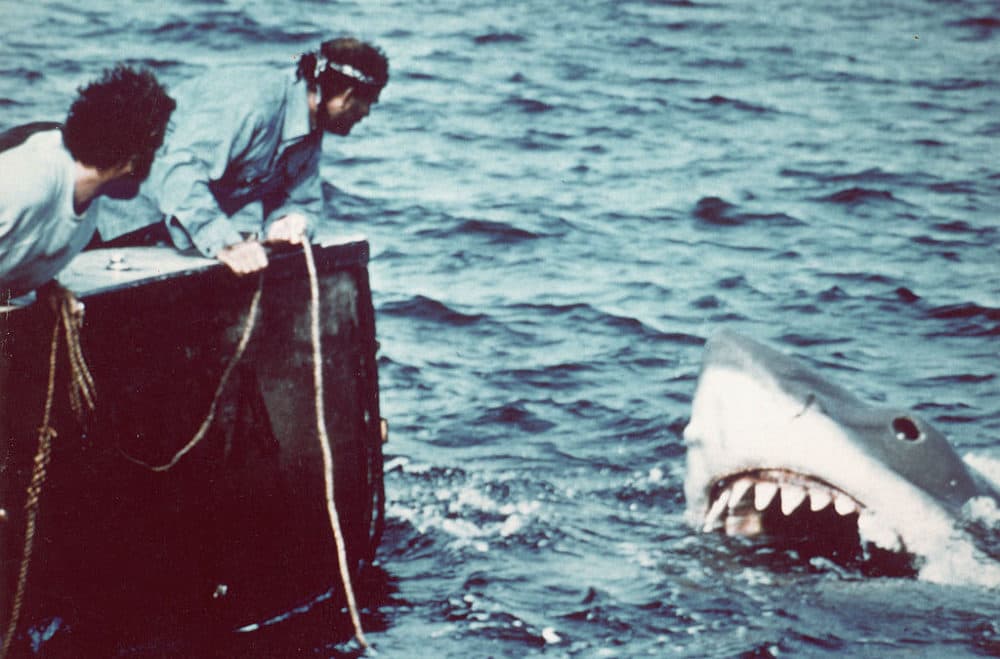Advertisement
Commentary
‘Jaws’ reigns as the perfect summer movie — especially in our era of paranoia

After two-plus years of claustrophobic caution or outright lockdown, vacationers are stampeding in all directions like the bulls at Pamplona. Here in Massachusetts, the most avid tourists have dorsal fins. This summer reaffirms the state’s status as Shark Central, with more than 20 great white sightings off Cape Cod in the first week of August alone. Meanwhile, a rare hammerhead damn near beached itself on Nantucket.
’Tis the season to watch — or re-watch for the 117th time — the greatest film ever, “Jaws.” (What, you were thinking “Citizen Kane”?)
I mean “season” not just meteorologically, though “Jaws” is the quintessential summer movie, with scenes shot on Martha’s Vineyard, the summer playground of presidents. This is also the cultural season for Steven Spielberg’s classic. Artistically, it’s on a par with that undisputed masterpiece, “The Godfather,” for reasons making this half-century-old shark tale relevant to 21st century Americans drowning in an ocean of polarization and paranoia.
Putting the two films in the same sentence is polarizing itself among connoisseurs. Yet the comparison was consecrated in a temple of hoity-toity, the New York Times Sunday arts section, which in 2000 published a reverent retrospective on “Jaws.” Long before mask mandates provoked assaults and the idea of “President Trump” provoked disbelieving laughs, the Times writer knew he’d stepped into a cultural minefield when insisting "‘Jaws,’ like ‘The Godfather,’ is a great film.”
Upturned noses scoff at that line because “Jaws” is, “after all, fundamentally a horror movie,” he wrote. “The movie has a lot more in common with ‘Dracula’ than with ‘Moby-Dick.’ This great white shark is no Great White Whale, gorging on metaphor; it's a monster, pure and simple, and its sole purpose is to generate fear.”
Therein lies the film’s greatness. Someone wrote that great art is great because it taps into deep emotions, and fear drills deep shafts indeed in the human psyche. Only the best filmmakers manipulate it deftly, as the vast amount of horror movie dreck attests. “Jaws,” the Times rhapsodized, is “truer to the experience of physical fear than any other horror movie, before or since.”
“Jaws” and its unabashed terrors speak for themselves. Why do they speak to our era?
The film hit theaters as the corrosive cynicism of the late 1960s and early ’70s crested. South Vietnam fell two months before the premiere, concluding the most divisive war in our history. Richard Nixon had resigned the presidency the year before, icing the can’t-trust-’em cake. “Jaws” cinematized this zeitgeist.
Having lost their innocence about their government, Americans now shed any illusions of safety in a refreshing ocean dip. “See it before you go swimming,” the trailer warned, with John Williams’ ba-dum, ba-dum-ba-dum underscoring the advice. (Some claimed beach attendance tanked in 1975 thanks to the movie.) The plotline about municipal-level Nixons covering up the lethal shark attacks to preserve tourism profits further makes the film an homage to paranoia.
Advertisement
The plotline about municipal-level Nixons covering up the lethal shark attacks to preserve tourism profits further makes the film an homage to paranoia.
Sound familiar? Paranoia marbles America today: the armed mob that gassed up on stolen-election conspiracies for its trip to the Capitol; replacement theory mongers, from Tucker Carlson to a mass murderer; climate change deniers. My only hesitation in recommending “Jaws” in this environment is that MAGA types might mistake it for a documentary and squeal, Aha! Told you not to trust the deep state!
Nevertheless, the movie offers reassurance that we have survived polarizing, corrupt times before, even if Donald Trump makes Amity’s venal mayor — and Nixon — look like the Little Sisters of the Poor.
Of course, 16-year-old me didn’t glean socio-political import at the Princeton, New Jersey opening of “Jaws.” I just sat back and enjoyed the show. As an insecure high-schooler, I related to the film’s klutzy, Dramamine-popping, ocean-phobic police chief, the Everyman who vanquishes the monster. Charlton Heston pined for the role; Spielberg cast the less-celebrated Roy Scheider, who homered in the part.
Some viewers in 2022, confronting an ongoing threat to our democracy, climate change and the lingering tentacles of a pandemic, might pass on a horror movie, even one seasoned with humor, on grounds that real life is stressful enough. The historically curious, however, might enjoy a post-Watergate period piece. The rest of us will relish the thrills, that classic score, and the literally explosive climax.
“If every summer movie were as good as ‘Jaws,’" the Times concluded, “none of us would ever get to the beach.” That would deny us one of summer’s pleasures. Then again, Cape Cod’s real sharks would be one less thing to worry about.
